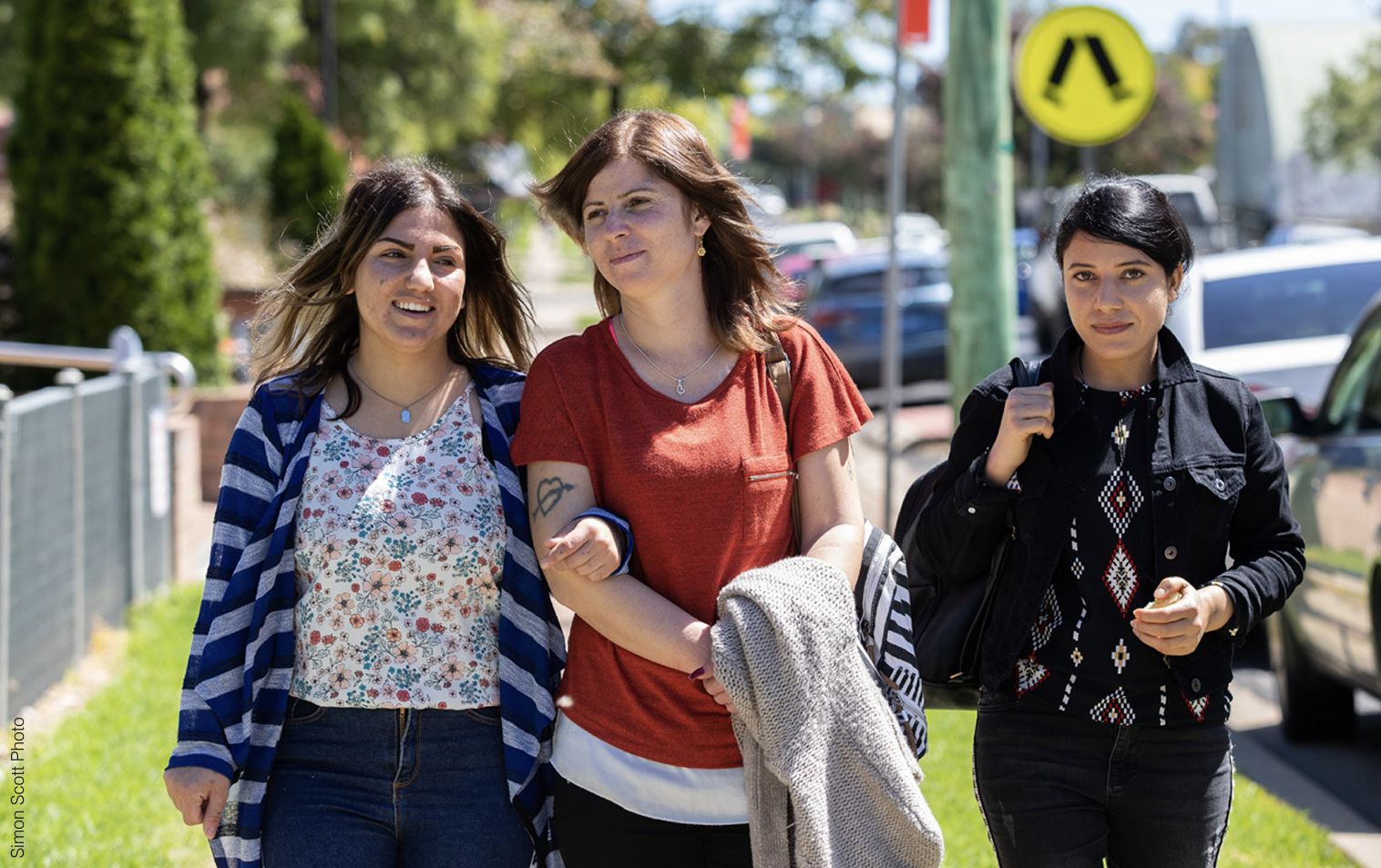Foundations For Belonging

Leaving your comfort zone and integrating into a new environment poses challenges for everyone, but it is particularly difficult for refugees who navigate a new chapter of their lives in an unfamiliar country. In Australia, successful refugee integration is typically assessed by a narrow band of markers such as employment, education, English language proficiency, and health. While outcomes in these areas are important, they do not capture the full spectrum of factors contributing to belonging.
Foundations for Belonging, a research project conducted by the Institute for Culture and Society (ICS) and Settlement Services International (SSI ) (opens in a new window), indicates that evaluating a sense of belonging can provide much more significant insights into how newly arrived refugees relate to their environment and identify with their communities. The social dimensions of settlement, such as the impact of simple everyday encounters and experiences, have been under-researched until recently.
Foundations for Belonging is a long-term collaboration that primarily came to life in 2020 to provide a snapshot of settlement and integration among newly arrived refugees. The first report of the collaboration, launched during refugee week 2020, revealed that refugees are building mixed social networks, which helps them to trust Australian institutions and fulfill social responsibilities. The report contained vital findings of the research and a set of recommendations for government departments, policymakers, service providers, and civil society to help strengthen their contribution to the settlement and integration of refugees.
Due to the significance of the research, ICS and SSI continued to collaborate in 2021 and 2022 to build on the previous year’s data by conducting barometer surveys at regular intervals. Focusing on the gender disparities, one of the key findings of the 2020 research, the 2021 research put refugee women and digital inclusion into the spotlight. Telephone surveys were conducted with 418 participants in their preferred first language, and multiple steps were taken to ensure the validity and reliability of the findings. The research found that there is a small but consistent gap for refugee women in terms of digital ability. Due to the pandemic, most government services are now being offered online, and this finding points to the fact that refugee women experience far more difficulty accessing these services.
The third phase of the project was carried out in 2022. The surveys, which looked at the pandemic’s impact on refugee communities, were conducted during COVID-19 lockdowns. The 2022 annual report reveals the consequences of prolonged family separation and the favourable settlement and integration outcomes of family reunion. The researchers recommended the expansion of family reunion pathways to reduce the negative impacts of ongoing isolation and uncertainty exacerbated by the pandemic, among other policy changes.
The 2022 report launch was attended by the immigration minister Andrew Giles who commended the project for providing in-depth insights into the refugee experience and its contribution to public policy discussions.
The research highlighted that everyday encounters with service providers, neighbours, friends, and other community members play a critical role in the belonging and integration of newly arrived refugees. One participant said:
“The most things that made me feel that I am welcome here was at the airport. When the officers saw the visa and saw that we are refugees and permanent residents, they said, “Welcome to your home”. And the other thing, I came to this country and I found that with my rights and responsibilities here, I am the same as citizens, so that makes me feel that I am welcome in this country […] The rights, the equality. There’s no discrimination, and this is what’s beautiful in Australia. There’s no discrimination based on religion, race, or sex. Anybody who comes here feels that they belong.” (Hakeem, male, mid-thirties, from Syria.)
These findings also challenge the long-standing claims that refugees do not demonstrate a sense of responsibility to Australia. Instead, the refugees report a solid commitment to fulfilling social and civic duties in Australia.
Until recently, refugees’ poor access to essential and targeted services had been interpreted as a result of low levels of trust in government services. This study provides a very different picture of the social climate in Australia as refugees expressed very high levels of confidence in government and essential services. Limited skills in the English language and long waiting times have been identified as the two main barriers to refugees’ access to services.
ICS is proud to be part of this collaboration, which uses primary data to fundamentally challenge the long-established beliefs about the refugees’ level of trust in Australian institutions and their sense of belonging. Moreover, by shining a light on an under-researched dimension of integration, the report reinforces the theory that refugee integration is a two-way process that relies on shared responsibility and actions by everyone, including new arrivals, the broader community, and the government.
The report engages directly with the policy of settlement in Australia, making recommendations based on the research findings, which aim to build on refugees’ positive sense of welcome and trust in the early stages of settlement. These recommendations, if taken up by the Minister, would benefit the settlement services providers and the communities they work in.
Foundations for Belonging 2020-2022 was co-authored by Ingrid Culos, Hussain Rajwani, Tadgh McMahon, Sukhmani Khorana, Shanthi Robertson, Emilie Baganz, Liam Magee, and Yamamah Agha.
Partner with ICS
If you would like to collaborate with us or find out more about what we can offer you, please get in touch with our Senior Business Development Officer - Sally Byrnes - using the details below.
Email: S.Byrnes@westernsydney.edu.au
Phone: +61 421 320 441




